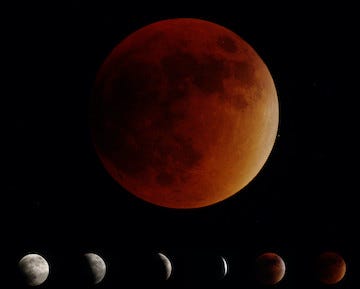Dear Lunatics,
Last night, I stayed up late clutching my crumpled Powerball ticket.
The drawing, which had been scheduled for 11 PM, was delayed due to some kind of technical difficulty.
The numbers that would determine who, if anyone, would claim the record $1.9 billion prize could be released at any moment.
I could sense that I was not alone.
Stretched across America, a bleary-eyed army of hopefuls refused to go to bed, feeling strangely euphoric while waiting for these shy numbers to appear. For in those suspended hours, we were all potential billionaires. We existed in a superposition of flat-broke and rich beyond our wildest dreams.
If you stayed up like me, you may have glanced out the window in the early hours and spotted the lunar eclipse. The Moon turned a shade of hazy vermillion, as though someone had accidentally thrown a red sock into its wash cycle.
This Blood Moon has been blamed not just for crashing the Powerball, but for causing astrological chaos, portending a Red Wave in the U.S. elections, and churning up another potential hurricane to cancel next week’s launch of Artemis 1, which has already been delayed four times.
I’m impatient to see Artemis 1 aloft, despite the fact that no humans will be aboard.
The crew of Artemis 1 will be “unmanned” in more ways than one: its two passengers, Helga and Zohar, are female mannequins.
Outfitted with 10,000 passive sensors and 34 active detectors, Helga and Zohar will record their contact with electromagnetic waves during their month-long space jaunt.
It’s possible that female bodies carry a higher risk of side effects from radiation exposure, so the data collected by Helga and Zohar will be key to Artemis 3, which is slated to land the first woman on the Moon.
The Moon is unforgiving terrain. Its weak magnetic field offers only the thinnest parasol of protection from cosmic rays, which will gnaw away at the DNA of astronauts and raise their risk, over time, of developing cancer.
NASA is currently settling on an acceptable level of radiation exposure for its astronauts.
As reported by Scientific American:
The goal of the radiation maximum is to keep an individual below a 3 percent risk of cancer mortality: in other words, with this radiation limit, at most three out of 100 astronauts would be expected to die of radiation-induced cancer in their lifetime.
Of course, we all live with the risk of accumulated radiation poisoning now that we’re bathed in an ocean of electromagnetic signals.
Who thinks twice about handling their phone, carrying it in their pocket, pressing it against their ear?
If you actually dig into the fine print, you’ll find a warning: do not bring this phone within half an inch of your body.
They don’t exactly plaster this warning on the box, which is why, in fifty years, I expect that we will look back on our phone use the way we currently look back on cigarette use.
In future films, the bad boy won’t be sneaking a smoke behind the school; he’ll be pawing an iPhone under his covers.
As it turns out, cigarette smoke is also radioactive.
It contains, among other well-known contaminates, polonium-210.
This reminds me of the theoretical physicist Ted Taylor.
He was the first man to light a cigarette with a nuclear explosion instead of a match or lighter.
In June 1952, Taylor was stationed at a test site in Nevada’s Yucca Flats when an experimental nuclear weapon was detonated. He used a parabolic mirror to focus the explosion’s blinding light into a beam that touched the tip of his cigarette, which blazed and released a curl of smoke.
Of course, the explosion also released something else: a plume of radiation that wafted toward distant suburbs and cities.
At Los Alamos Laboratory, Ted Taylor was designing nuclear weaponry, and he felt no moral qualms about his work.
As he told Mother Jones, “We were fascinated by abstract violence on a huge scale. I became addicted to nuclear weapons work. It gave me a sense of great power.”
But as Taylor would describe in his unpublished memoir, Changes of Heart, he eventually realized the apocalyptic potential of what he was building. For the rest of his life, he worked as an activist for nuclear non-proliferation.
Ted Taylor’s conversion must have seemed like a bolt from the blue to his colleagues. Yet Taylor hadn’t become a different person; he had become more aware of the person he was.
As he told Voices of the Manhattan Project:
I’ve talked with several professional psychiatrists about this. They agreed that it is an interesting, real possibility that there is a tendency in me, that I was born with, that is a psychological reaction to certain kinds of violence. I mean, I am very attracted to what happens when lightning hits that tree right there. I like it. Most people don’t.
Recently, scientists have discovered that lightning leaves behind a radioactive cloud.
I’d wager this is not the chief concern of someone struck by lightning. However, it provides neurotic fliers with a brand new reason to fret. As their plane shudders through a thunderstorm, they may be unknowingly doused with radiation.
No, lightning strike survivors have more pressing things to worry about.
According to Louis Proud’s Strange Electromagnetic Dimensions: The Science of the Unexplainable":
…a small yet not insignificant percentage of lightning strike survivors [have] been struck by lightning not once but two or three times (in some cases more), as though possessed of the ability to draw lightning from the sky, albeit unintentionally.
How do we explain these human lightning rods?
And how do we explain the fact that many lightning survivors report symptoms of High Voltage Syndrome, a malady you won’t find in a medical textbook but that is much discussed in internet enclaves?
Sufferers of HVS claim to scramble any TV they brush passed and pop any lightbulb they get close to. They go through appliances like tissues.
Other people call themselves SLIders (from Street Light Interference) because streetlights flicker off as they walk under them and flicker back to life once they’ve passed.
A close cousin of these anomalous conditions is the so-called “Pauli Effect.”
Wolfgang Pauli was a Nobel Prize-winning theoretical physicist who, due to his notorious effect on machinery, was banned from entering many physics laboratories.
When he did venture inside, glass beakers would shatter, sensitive instruments would go haywire, and costly equipment would blow up.
His mere presence on the Princeton campus once caused a cyclotron with a 50-ton magnet to inexplicably combust.
Pauli was a dark thundercloud emitting lightning wherever he drifted.
In 1943, Pauli expressed an interest in moving to Los Alamos to work on the Manhattan Project. J. Robert Oppenheimer, who was heading the development of the first atomic bomb, wrote to Pauli:
…at the present time it would be a waste and an error for you to do [that research directly connected to the war.] You are just about the only physicist in the country who can help to keep those principles of science alive which do not seem immediately relevant to the war, and that is eminently worth doing.
This is an incredibly diplomatic way to say please, please, for the love of God, stay away.

Skeptics have dismissed the Pauli Effect as a self-fulfilling superstition, they have filed the SLIders phenomenon under “voodoo science,” and they have roundly rejected the very idea of a High Voltage Person.
They think it’s absurd.
Utterly ridiculous.
And I have no doubt I would loudly agree—if I wasn’t closely related to a High Voltage Person.
There’s a reason my Dad still wears a battery watch and owns a windup alarm clock. His proximity shuts down technology. He’s like an eclipse, casting his shadow over all things digital.
“I’ve never seen this before,” says the supermarket cashier, the airline ticket agent, the DMV worker, as they stare at their screen, which is either freezing, strobing, or on a psychedelic trip.
When I was younger, I used to wonder if my Dad, who traveled frequently for work, could be a secret agent. But then I’d hear him downstairs swearing at the desktop computer, which operated smoothly for everyone but him, and I’d think, nah.
Though really, it’s the American military’s loss. Deployed strategically, my Dad could scramble radars, knock out enemy power stations, and do what Ted Taylor always campaigned for—shut down nuclear weapons.
Where did my father’s affliction come from?
Was he born with it, the way Ted Taylor was born with a taste for violence on a huge scale?
Or was it an acquired super-weakness?
Whatever the origins of his High Voltage Syndrome, I’m sorry to report that it can be inherited.
My brother can take down a whole office floor—computers, phone lines, Xerox machines, the works. When the puzzled faces begin to appear over the tops of cubicles, he shrugs. What can he do?
Obviously, I haven’t inherited this paternal electromagnetic curse. If I had, you wouldn’t be reading this right now. This email would have slid directly into your trash folder.
But that doesn’t mean I haven’t caused havoc indirectly.
I have to apologize for the Powerball fiasco.
While my Dad never plays the lotto—with his luck, why would he bother?— I did ask him to buy my ticket last night.
So maybe we should have seen the lottery’s “unprecedented glitch” coming.
I don’t know about you, but in the coming week, I’ll be keeping a weather eye on the vast skies over Cape Canaveral, Florida.
If a fresh hurricane threatens to once again scuttle the launch of Artemis 1, pushing those distraught NASA engineers to the edge of sanity, I won’t stand idly by.
Using force if necessary, I will drive my Dad across the Canadian border, where he will remain—comfortable but under guard—until Artemis 1, with Helga and Zohar safely strapped in, has finally lifted off.
See you on the Cold Moon!
—WD
PS. If you missed this morning’s bloody eclipse, the last one until 2025, you can watch a livestream recorded by Dr. Gianluca Masi, an Italian astrophysicist who reminds me of a garrulous Galileo.
Thank you for reading! If you enjoyed this post, please consider subscribing to this newsletter, which is as free as looking at the Moon.
And please consider sharing this post with some of your fellow Earthlings 🚀.











I look forward to these Moon writings every month. Love the fluidity of facts mixed with storytelling, and the full-circle ending on this one was super! Thanks for these monthly gifts 🙏😊
“The Moon turned a shade of hazy vermillion, as though someone had accidentally thrown a red sock into its wash cycle.” 🪐🤍